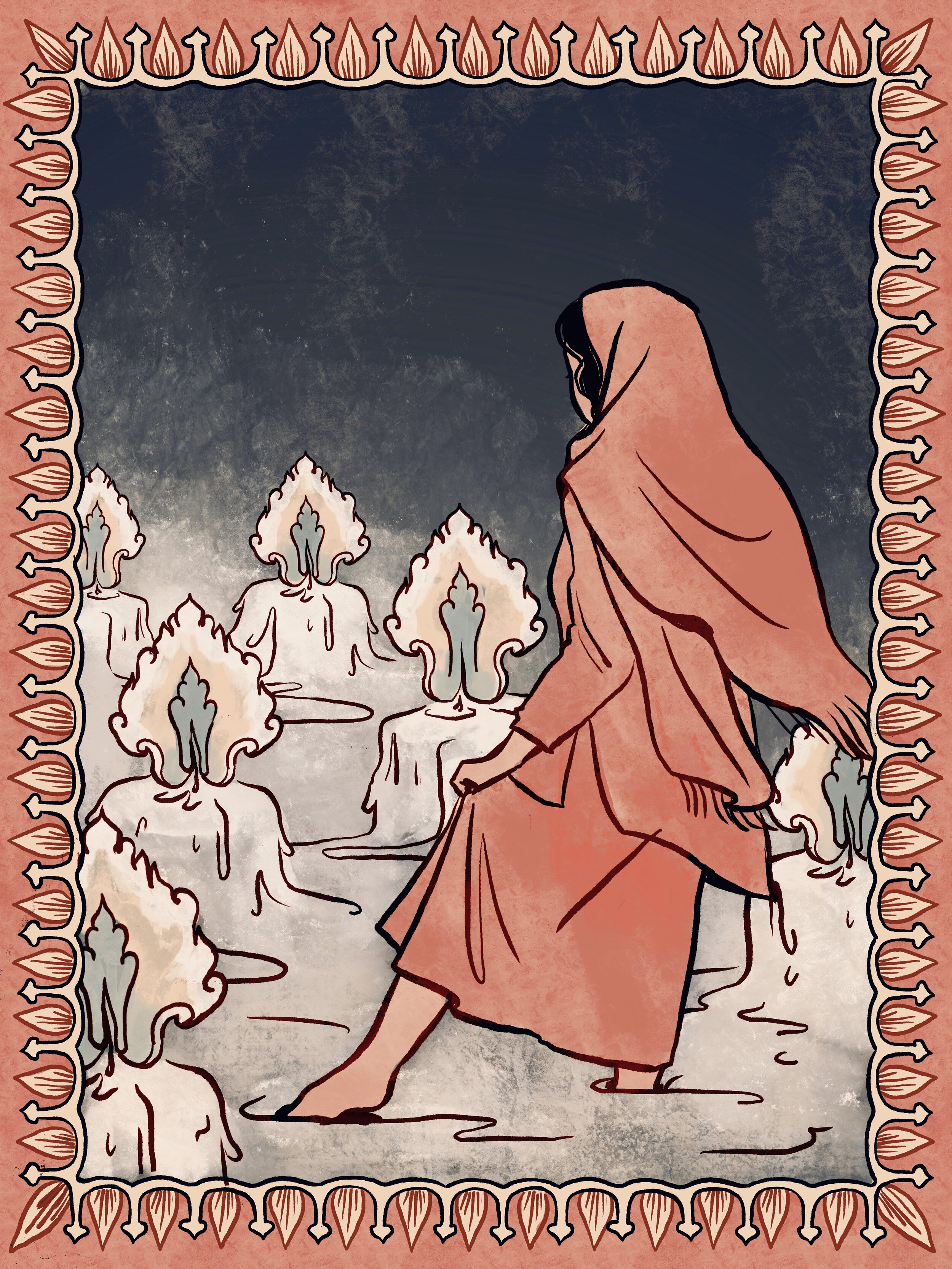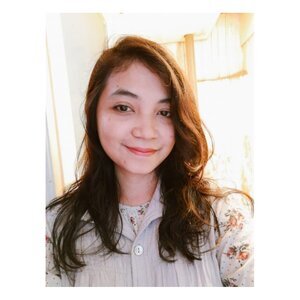Mediterranean Lyric and Other Poems
Khairani Barokka
Illustration by Nadiyah Rizki.
mediterranean lyric
you dip a toe
inside of water.
water tells you
your toe is the
problem. ripples
out slow, might
turn lake to skin.
too much foot
is in liquid, human
can’t be mer-
population. all
the doors escape
through water,
all water closes,
blood dissipation is
one corpse’s
constant. sea
turned to flesh,
it’s a sea ground up
into bowls, a river
of muscles.
your one
small toe is the
problem.
all souls
in a cupped bowl
of let them, let
them. no true water
escapes skin
follicles’ mingling,
tiredness swelling
into sunken limb.
hope is a sea-
storm’s kindling.
fire in the mouth
of waves
and mistral.
This poem was first published in The Missing Slate, reprinted in the Wretched Strangers anthology (Boiler House Press) and will be in Ultimatum Orangutan (Nine Arches).
Poet’s note: As a Muslim woman who has lived as a minority in Western countries for most of her life, and someone with Muslim family in the States, I’ve felt physically nauseated by everything going on. All these families torn apart. It’s brought up memories of the Islamophobia my family and I have experienced, and I’ve also been shamed for speaking up for my beliefs regarding refugees recently, and been told we “play the victim”. The constant stream of suffering from bigoted politics seems overwhelming. However, the upswell of resistance and solidarity has been incredible. It’s been heartening. It’s been hope.
My Mother Calls Me Srikandi
Bow and arrow clasped beneath the ribcage.
Sex turned, pulverised passionfruit, inside out.
Killed by swordsmanship. A wren
Of a beached thing, flailing, always once
Something else. We were once always
Gods,
Mythological creatures, imagined
As future generation in a bowl
Of cassava given to a toddler, mollified
Only by prophecies come to bear,
On stories collectively hung upon midnight.
A soul in Shikandini’s shapeshifting body,
Vapor, her lungs
Dripping wax from shadows.
This poem was first published in The Missing Slate.
Poet’s note: Srikandi or Shikandini is a figure in Indian as well as Javanese mythologies, each with different retellings. My mother invariably calls me this as a compliment.
Epicdermis
It strikes me: the analogy of woman to country
recurs in part because, in fact, to some it’s easy —
to visualise the gleam of the new as both
shore of the Indies (West, or as it were my East),
and a smooth stretch of sandy clavicle,
high-hilled buttock, fleshy ankle. Shining
shimmering splendid, Aladdin’s new world,
all subcutaneous fat and follicles.
Colonise at will, with reliable prophylactics.
Wouldn’t it be nice, if before the necessary culture clash,
they listened to the natives’ oral wisdom,
became versed in the ethnomathematics
of the tribe, and read in the original tongue
the bafflingly complex philosophies of the gods,
in temples of perplexingly less savagery than presumed?
Baby, I’m just saying.
This poem was first published in Media Diversified and was published in Rope (Nine Arches).
© Khairani Barokka
LIRIK MEDITERANIA DAN PUISI-PUISI LAINNYA
Khairani Barokka
Diterjemahkan oleh Novia Rika Perwitasari
Ilustrasi oleh Nadiyah Rizki.
lirik mediterania
kau celupkan jari kakimu
ke dalam air.
air bercerita
jari kakimu adalah
masalah. beriak
lambat, mungkin
mengubah danau menjadi kulit.
terlalu banyak kaki
dalam cairan, manusia
tak mungkin menjadi bangsa
duyung. semua
pintu melarikan diri
melalui air,
seluruh air menutup,
menghilangnya darah
ialah ketetapan
suatu mayat. laut
menjelma daging
selasar laut tergerus,
ke dalam mangkuk, sebuah sungai
jalinan otot.
satu
jari kecil kakimu adalah
masalah.
semua jiwa
dalam mangkuk bertangkup
biarkan mereka, biarkan
mereka. tak ada air nyata
lolos dari kulit
percampuran folikel,
lelah membengkak
ke dalam tungkai yang karam.
harapan adalah lautan—
badai yang berkobar.
api di mulut
rangkaian ombak
dan mistral.
Catatan penyair: Sebagai perempuan Muslim yang hidup sebagai minoritas di negara Barat, dan memiliki saudara-saudara Muslim di Amerika, aku mual secara fisik atas semua hal yang terjadi. Seluruh keluarga terpecah-belah. Hal ini membawa kenangan tentang Islamofobia yang pernah aku dan keluargaku alami, aku juga pernah dipermalukan ketika mengutarakan pendapatku mengenai pengungsi baru-baru ini, dan kami dianggap “berlaku sebagai korban”. Aliran pemberitaan penderitaan akibat politik fanatik sangat berdampak besar. Namun, lonjakan perlawanan dan solidaritas begitu luar biasa. Sungguh membesarkan hati. Memberikan harapan.
Ibu Memanggilku Srikandi
Busur dan panah tergenggam di bawah tulang rusuk.
Kelamin berubah, markisa terlumat, luar dalam.
Terbunuh kelihaian pedang. Burung kecil
Benda yang terdampar, berkepak-kepak, kita dahulu selalu
Sesuatu yang lain. Dahulu kita selalu menjadi
Dewa,
Makhluk mitologi, dibayangkan
Sebagai generasi masa depan dalam sebuah mangkuk
Ubi yang diberikan kepada anak-anak, ditenangkan
Oleh datangnya ramalan yang harus ditanggung,
Dalam kisah-kisah yang tergantung di tengah malam.
Jiwa dalam perubahan tubuh Shikandini
Menguap, paru-parunya
Meneteskan lilin dari bayang kegelapan.
Catatan penyair: Srikandi atau Shikandini adalah karakter dalam mitologi India dan Jawa, masing-masing dengan penceritaan yang berbeda. Ibuku terkadang memanggilku dengan nama itu sebagai sebuah pujian.
Epikdermis
Sesuatu menusukku: analogi seorang perempuan dan sebuah negara
terulang dalam beberapa bagian karena, nyatanya, bagi sebagian orang itu mudah—
untuk mencitrakan sinar baru keduanya
pantai-pantai Hindia (Barat, atau bagiku Timur),
dan rentangan halus tulang selangka berpasir,
pantat menjulang, pergelangan kaki gemuk. Bersinar
berkilau memukau, dunia baru Aladdin,
Semua lemak subkutan dan folikel.
Jajahlah sesuka hati, dengan profilaktik andal.
Tidakkah akan lebih baik, jika sebelum budaya berseteru,
mereka mengindahkan kearifan lisan penduduk asli
memahami etnomatematika
suku-suku, dan membaca dalam bahasa asal
filosofi rumit membingungkan dari dewa-dewa
di dalam kuil yang secara menakjubkan tak sebiadab yang diduga?
Sayang, aku hanya berkata saja.
© Khairani Barokka
Indonesian translation © Novia Rika Perwitasari
Photo by Derrick Kakembo.
KHAIRANI BAROKKA, aka Okka, is the writer/performer/producer of, among others, a deaf-accessible, solo poetry/art show, Eve and Mary Are Having Coffee. It premiered at Edinburgh Fringe 2014 as Indonesia’s only representative, with a grant from HIVOS. She was recognized in 2014 by UNFPA as one of Indonesia’s “Inspirational Young Leaders Driving Social Change", for highly prolific, pioneering international work in justice-oriented arts.
Published internationally in anthologies and journals, Okka has presented work extensively, in fifteen countries, is a frequent public speaker, and has been awarded various residencies, grants and award nominations, including a Pushcart Prize nomination. She is author and illustrator of poetry-art book Indigenous Species, nominated for a Goldsmiths Public Engagement Award (Tilted Axis Press, 2016; Vietnamese translation out in 2018 with AJAR Press), co-editor with Ng Yi-Sheng of HEAT: A Southeast Asian Urban Anthology (Fixi, 2016), and co-editor, with Sandra Alland and Daniel Sluman, of Stairs and Whispers: D/deaf and Disabled Poets Write Back (Nine Arches Press, 2017), shortlisted for a Saboteur Award for Best Anthology and a Poetry School Book of the Year. Work is published in Poetry Review, The Rialto, Ambit, Magma, Wasafiri, Stand, The New Inquiry, Asymptote, and other journals, anthologies and art books. She is a member of the collective Malika's Poetry Kitchen and received a PhD by Practice in Goldsmiths’ Visual Cultures Department, as an LPDP Scholar. Okka is currently working on a book and visual works. Her most recent exhibition was Annah: Nomenclature at the ICA. Her first full-length poetry collection, Rope, was published by Nine Arches Press in October 2017.
NOVIA RIKA PERWITASARI is a banker who is passionate about poetry. She has won first prize in several Indonesian poetry competition. She is the founder of Indonesian poetry website, Poetry Prairie. Her poems have been published in various poetry anthologies in Indonesia, and her English poems have also been published in international platforms such as Dying Dahlia Review, Optimum Zine, “Haiku Masters” by NHK TV Japan and The Poetry Kit.
NADIYAH RIZKI is a freelance illustrator and comic artist who lives in Bandung. Her work can be seen at nadiyahrs.com.




